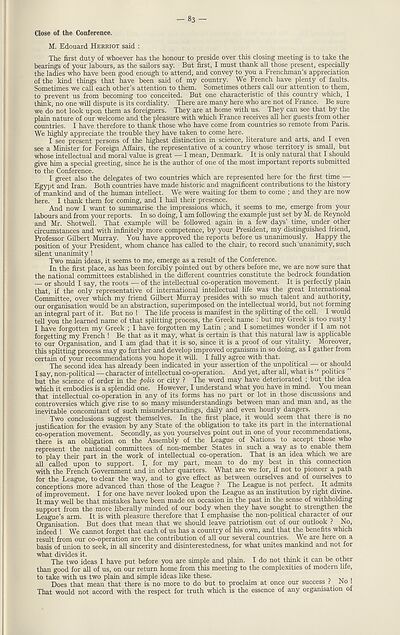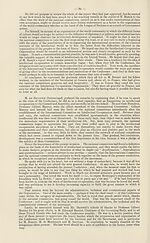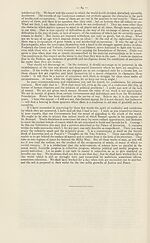International > Proceedings of the second General conference of national committees on intellectual co-operation, Paris, July 5th-9th, 1937
(85)
Download files
Complete book:
Individual page:
Thumbnail gallery: Grid view | List view

83
Close of the Conference.
M. Edouard Herriot said :
The first duty of whoever has the honour to preside over this closing meeting is to take the
bearings of your labours, as the sailors say. But first, I must thank all those present, especially
the ladies who have been good enough to attend, and convey to you a Frenchman’s appreciation
of the kind things that have been said of my country. We French have plenty of faults.
Sometimes we call each other’s attention to them. Sometimes others call our attention to them,
to prevent us from becoming too conceited. But one characteristic of this country which, I
think, no one will dispute is its cordiality. There are many here who are not of France. Be sure
we do not look upon them as foreigners. They are at home with us. They can see that by the
plain nature of our welcome and the pleasure with which France receives all her guests from other
countries. I have therefore to thank those who have come from countries so remote from Paris.
We highly appreciate the trouble they have taken to come here.
I see present persons of the highest distinction in science, literature and arts, and I even
see a Minister for Foreign Affairs, the representative of a country whose territory is small, but
whose intellectual and moral value is great — I mean, Denmark. It is only natural that I should
give him a special greeting, since he is the author of one of the most important reports submitted
to the Conference.
I greet also the delegates of two countries which are represented here for the first time —
Egypt and Iran. Both countries have made historic and magnificent contributions to the history
of mankind and of the human intellect. We were waiting for them to come ; and they are now
here. I thank them for coming, and I hail their presence.
And now I want to summarise the impressions which, it seems to me, emerge from your
labours and from your reports. In so doing, I am following the example just set by M. de Reynold
and Mr. Shotwell. That example will be followed again in a few days’ time, under other
circumstances and with infinitely more competence, by your President, my distinguished friend,
Professor Gilbert Murray. You have approved the reports before us unanimously. Happy the
position of your President, whom chance has called to the chair, to record such unanimity, such
silent unanimity !
Two main ideas, it seems to me, emerge as a result of the Conference.
In the first place, as has been forcibly pointed out by others before me, we are now sure that
the national committees established in the different countries constitute the bedrock foundation
— or should I say, the roots — of the intellectual co-operation movement. It is perfectly plain
that, if the only representative of international intellectual life was the great International
Committee, over which my friend Gilbert Murray presides with so much talent and authority,
our organisation would be an abstraction, superimposed on the intellectual world, but not forming
an integral part of it. But no ! The life process is manifest in the splitting of the cell. I would
tell you the learned name of that splitting process, the Greek name : but my Greek is too rusty !
I have forgotten my Greek ; I have forgotten my Latin ; and I sometimes wonder if I am not
forgetting my French ! Be that as it may, what is certain is that this natural law is applicable
to our Organisation, and I am glad that it is so, since it is a proof of our vitality. Moreover,
this splitting process may go further and develop improved organisms in so doing, as I gather from
certain of your recommendations you hope it will. I fully agree with that.
The second idea has already been indicated in your assertion of the unpolitical — or should
I say, non-political — character of intellectual co-operation. And yet, after all, what is politics
but the science of order in the fiolis or city ? The word may have deteriorated ; but the idea
which it embodies is a splendid one. However, I understand what you have in mind. You mean
that intellectual co-operation in any of its forms has no part or lot in those discussions and
controversies which give rise to so many misunderstandings between man and man and, as the
inevitable concomitant of such misunderstandings, daily and even hourly dangers.
Two conclusions suggest themselves. In the first place, it would seem that there is no
justification for the evasion by any State of the obligation to take its part in the international
co-operation movement. Secondly, as you yourselves point out in one of your recommendations,
there is an obligation on the Assembly of the League of Nations to accept those who
represent the national committees of non-member States in such a way as to enable them
to play their part in the work of intellectual co-operation. That is an idea which we are
all called upon to support. I, for my part, mean to do my best in this connection
with the French Government and in other quarters. What are we for, if not to pioneer a path
for the League, to clear the way, and to give effect as between ourselves and of ourselves to
conceptions more advanced than those of the League ? The League is not perfect.. It admits
of improvement. I for one have never looked upon the League as an institution by right divine.
It may well be that mistakes have been made on occasion in the past in the sense of withholding
support from the more liberally minded of our body when they have sought to strengthen the
League’s arm. It is with pleasure therefore that I emphasise the non-political character of our
Organisation. But does that mean that we should leave patriotism out of our outlook ? No,
indeed ! We cannot forget that each of us has a country of his own, and that the benefits which
result from our co-operation are the contribution of all our several countries. We are here on a
basis of union to seek, in all sincerity and disinterestedness, for what unites mankind and not for
what divides it. . . ,
The two ideas I have put before you are simple and plain. I do not think it can be otner
than good for all of us, on our return home from this meeting to the complexities of modern life,
to take with us two plain and simple ideas like these. _ .
Does that mean that there is no more to do but to proclaim at once our success . No .
That would not accord with the respect for truth which is the essence of any organisation of
Close of the Conference.
M. Edouard Herriot said :
The first duty of whoever has the honour to preside over this closing meeting is to take the
bearings of your labours, as the sailors say. But first, I must thank all those present, especially
the ladies who have been good enough to attend, and convey to you a Frenchman’s appreciation
of the kind things that have been said of my country. We French have plenty of faults.
Sometimes we call each other’s attention to them. Sometimes others call our attention to them,
to prevent us from becoming too conceited. But one characteristic of this country which, I
think, no one will dispute is its cordiality. There are many here who are not of France. Be sure
we do not look upon them as foreigners. They are at home with us. They can see that by the
plain nature of our welcome and the pleasure with which France receives all her guests from other
countries. I have therefore to thank those who have come from countries so remote from Paris.
We highly appreciate the trouble they have taken to come here.
I see present persons of the highest distinction in science, literature and arts, and I even
see a Minister for Foreign Affairs, the representative of a country whose territory is small, but
whose intellectual and moral value is great — I mean, Denmark. It is only natural that I should
give him a special greeting, since he is the author of one of the most important reports submitted
to the Conference.
I greet also the delegates of two countries which are represented here for the first time —
Egypt and Iran. Both countries have made historic and magnificent contributions to the history
of mankind and of the human intellect. We were waiting for them to come ; and they are now
here. I thank them for coming, and I hail their presence.
And now I want to summarise the impressions which, it seems to me, emerge from your
labours and from your reports. In so doing, I am following the example just set by M. de Reynold
and Mr. Shotwell. That example will be followed again in a few days’ time, under other
circumstances and with infinitely more competence, by your President, my distinguished friend,
Professor Gilbert Murray. You have approved the reports before us unanimously. Happy the
position of your President, whom chance has called to the chair, to record such unanimity, such
silent unanimity !
Two main ideas, it seems to me, emerge as a result of the Conference.
In the first place, as has been forcibly pointed out by others before me, we are now sure that
the national committees established in the different countries constitute the bedrock foundation
— or should I say, the roots — of the intellectual co-operation movement. It is perfectly plain
that, if the only representative of international intellectual life was the great International
Committee, over which my friend Gilbert Murray presides with so much talent and authority,
our organisation would be an abstraction, superimposed on the intellectual world, but not forming
an integral part of it. But no ! The life process is manifest in the splitting of the cell. I would
tell you the learned name of that splitting process, the Greek name : but my Greek is too rusty !
I have forgotten my Greek ; I have forgotten my Latin ; and I sometimes wonder if I am not
forgetting my French ! Be that as it may, what is certain is that this natural law is applicable
to our Organisation, and I am glad that it is so, since it is a proof of our vitality. Moreover,
this splitting process may go further and develop improved organisms in so doing, as I gather from
certain of your recommendations you hope it will. I fully agree with that.
The second idea has already been indicated in your assertion of the unpolitical — or should
I say, non-political — character of intellectual co-operation. And yet, after all, what is politics
but the science of order in the fiolis or city ? The word may have deteriorated ; but the idea
which it embodies is a splendid one. However, I understand what you have in mind. You mean
that intellectual co-operation in any of its forms has no part or lot in those discussions and
controversies which give rise to so many misunderstandings between man and man and, as the
inevitable concomitant of such misunderstandings, daily and even hourly dangers.
Two conclusions suggest themselves. In the first place, it would seem that there is no
justification for the evasion by any State of the obligation to take its part in the international
co-operation movement. Secondly, as you yourselves point out in one of your recommendations,
there is an obligation on the Assembly of the League of Nations to accept those who
represent the national committees of non-member States in such a way as to enable them
to play their part in the work of intellectual co-operation. That is an idea which we are
all called upon to support. I, for my part, mean to do my best in this connection
with the French Government and in other quarters. What are we for, if not to pioneer a path
for the League, to clear the way, and to give effect as between ourselves and of ourselves to
conceptions more advanced than those of the League ? The League is not perfect.. It admits
of improvement. I for one have never looked upon the League as an institution by right divine.
It may well be that mistakes have been made on occasion in the past in the sense of withholding
support from the more liberally minded of our body when they have sought to strengthen the
League’s arm. It is with pleasure therefore that I emphasise the non-political character of our
Organisation. But does that mean that we should leave patriotism out of our outlook ? No,
indeed ! We cannot forget that each of us has a country of his own, and that the benefits which
result from our co-operation are the contribution of all our several countries. We are here on a
basis of union to seek, in all sincerity and disinterestedness, for what unites mankind and not for
what divides it. . . ,
The two ideas I have put before you are simple and plain. I do not think it can be otner
than good for all of us, on our return home from this meeting to the complexities of modern life,
to take with us two plain and simple ideas like these. _ .
Does that mean that there is no more to do but to proclaim at once our success . No .
That would not accord with the respect for truth which is the essence of any organisation of
Set display mode to:
![]() Universal Viewer |
Universal Viewer | ![]() Mirador |
Large image | Transcription
Mirador |
Large image | Transcription
Images and transcriptions on this page, including medium image downloads, may be used under the Creative Commons Attribution 4.0 International Licence unless otherwise stated. ![]()
| League of Nations > International > Proceedings of the second General conference of national committees on intellectual co-operation, Paris, July 5th-9th, 1937 > (85) |
|---|
| Permanent URL | https://digital.nls.uk/195218280 |
|---|
| Shelfmark | LN.XII |
|---|
| Description | Over 1,200 documents from the non-political organs of the League of Nations that dealt with health, disarmament, economic and financial matters for the duration of the League (1919-1945). Also online are statistical bulletins, essential facts, and an overview of the League by the first Secretary General, Sir Eric Drummond. These items are part of the Official Publications collection at the National Library of Scotland. |
|---|---|
| Additional NLS resources: |
|

